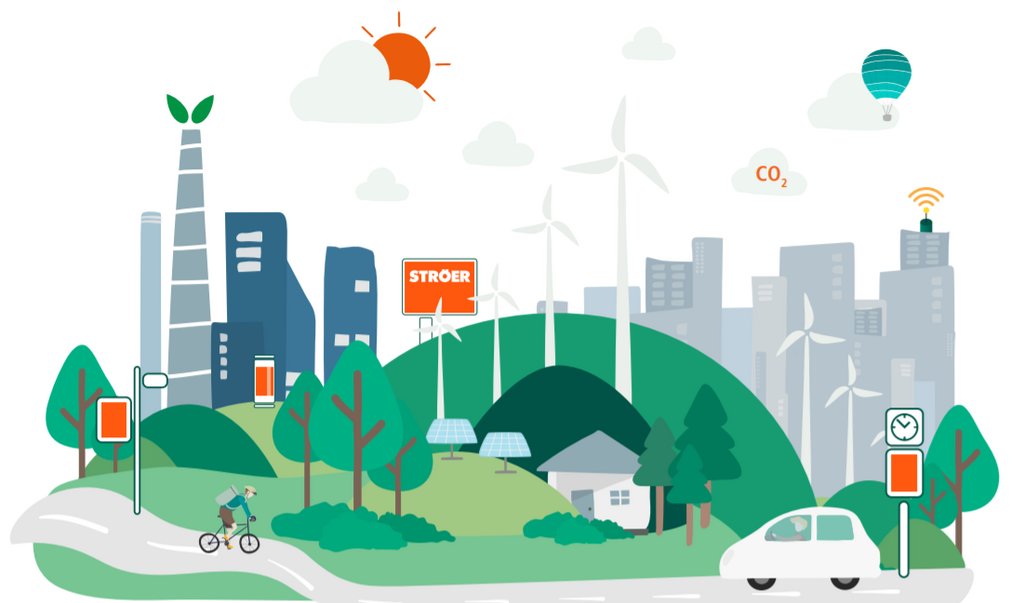
01. February 2022
Press release
Target group potentials, types and communication factors: Sustainability as an advertising message
Ströer provides sustainability types for individual media & brand evaluations in ‘best für planning (b4p)’
Ströer provides information on everyday behaviour, consumption and attitudes towards advertising and brands in the field of sustainability. The focus was on the question of what makes sustainable target groups tick and what motivators they bring with them to act sustainably.
Using comprehensive data analysis from qualitative online group discussions and a quantitative online survey, seven different sustainability types were identified: Missionaries, Aestheticians, Recyclers, Minimalists, Builders, Epicureans and Sustainability Buyers. All in all, all defined sustainability types within the German population result in a target group potential of about 33 million people.
“If you look at the results in detail, it quickly becomes clear: not everyone who acts sustainably ticks the same and almost everyone interprets sustainability or sustainable action differently," says Annina Bleek, SVP Solutions Studio at Ströer. "What is also striking: all types have different attitudes to the topic of advertising. In our study, we show the most important factors for successful, sustainable advertising and how the sustainability types are most likely to be addressed with advertising. All types were furthermore operationalised and are available for individual media & brand evaluations in ‘best für planning’ via Ströer.”
Indeed, the sustainability types are in a constant state of tension between the following factors:
- Sustainable action is about preserving the world, but at the same time it is also about transforming the world and stimulate a change in thinking.
- Sustainability enables the formation of one’s own attitude, at the same time it relieves the burden of following the “classic rules”.
- Sustainability promises that one can save the world. However, this world-saving requires enormous renunciation.
Minimalists, for example, soothe their conscience with small sustainable actions, such as not using plastic bags or recycling. Missionaries, on the other hand, want to save and change the world, are actively involved in organisations and work to convince others of their mission. Sustainability Buyers, on the other hand, are not prepared to do without things, but buy sustainable product alternatives.
Attitude towards advertising
Aestheticians, Builders and Sustainability Buyers are particularly positive about the topic of “sustainability in advertising” and consider advertising to be a good way to address environmental problems and motivate people to act more responsibly. However, all three types consider it very important that such advertising also fits the brand.
Missionaries are also more open than average to sustainability in advertising, but are also more likely than average to perceive such advertising as insincere. The same is true for Recyclers.
Epicureans and Minimalists are generally less positive about advertising that is linked to sustainability. However, both groups can still be reached well with sustainable products. Nonetheless, it is of central importance that the actual functionality and quality of these products be placed in the foreground in communication. Likewise, a factual and informative design of such advertising is of above-average importance for these two types.
All seven sustainability types are very mobile above average - but in different ways.
OOH advertising is one of the top touchpoints for advertising linked to sustainability for five out of seven sustainability types. By their own admission, OOH advertising is the top sustainability advertising touchpoint for Missionaries. For Builders, Sustainability Buyers, Recyclers and Epicureans, OOH advertising is also one of the top touchpoints for advertising linked to sustainability.
In addition, digital channels are highly relevant for all sustainability types. Sustainability Buyers use the offer of special websites on the topic of sustainability, while Builders tend to use digital newspapers/magazines.
You can find out more about sustainability at Ströer here: www.stroeer.de/en/sustainability/
Study outline
Survey method: online group discussions
Institute: [m]SCIENCE GmbH
Target groups: Heavy users (People for whom sustainability plays a central role); Light users (Everyone deals with the topic of sustainability from time to time)
Sample: 4 online group discussions with 6 participants each
Survey locations: Hamburg and surroundings, Cologne and surroundings
Survey period: CW 20 2021
Survey method: Quantitative online survey
Institute: [m]SCIENCE GmbH
Target group:16+, with interest in the topic of sustainability
Sample: N=2058; representative quota according to age, gender, HHNE and region
Survey period: September 2021 (CW35-CW37)
Disclaimer
This press release contains "forward-looking statements" regarding Ströer SE & Co. KGaA ("Ströer") or the Ströer Group, including assessments, estimates and forecasts about its financial position, business strategy, plans and objectives of management and future business activities by Ströer or the Ströer Group. Forward-looking statements are subject to known and unknown risks, uncertainties and other factors that could lead to the earnings situation, profitability, performance or results of Ströer or the Ströer Group being significantly different from the earnings situation, profitability, Performance or results that are expressly or implicitly assumed or described in these forward-looking statements. These forward-looking statements are made as of the date of this release and are based on numerous assumptions that may also prove to be incorrect. Ströer makes no representation and assumes no liability with regard to the correct presentation, completeness, correctness, appropriateness or accuracy of the information and assessments contained herein. The information contained in this announcement is subject to change without notice. They may be incomplete or abbreviated and may not contain all essential information relating to Ströer or the Ströer Group. Ströer assumes no obligation to publicly update or adapt the forward-looking statements or other information contained herein, either as a result of new information, future events or for any other reason.


